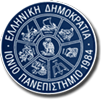Samsun
Theaters’ history

Author: GUN ELCIN
It is possible to trace the theatre activities in Samsun in relation to the developing commerce and the population’s increase. While the shadow puppetry of Karagoz & Hacivat and the travelling circuses dominated in the enterainment of the Muslim population, the merchants trading with the western countries were inclined towards theatres. The theatres began their activities after 1884 after the living standards of the emerging bourgeois class improved, along with the development of the Samsun port and the tobacco trade. Particularly after the Crimean War (1853-1856), it can be argued that it was the increasing Western consulates and their staff that started to import such cultural habits to Samsun[1]. It has been poined out that the first known theatre in Samsun was the Armenian Theatre, founded in 1883, close to the Samsun Tobacco Factory (Regie)[2]. For the first time in 1909, Nemlizade Hamdi Bey of the Nemlizade family, who rose to wealth with the tobacco trade, opened the Constitutionalist Theatre, belonging to Muslims, next to the Samsun Tobacco Factory storehouses. The first performances in this approximately 1000-seat theatre were performed by the troupes of an Istanbulite, Ahmet Fehim, and of Armaniyan Efendi from Samsun, who was at Tbilisi at the time[3]. The other theatre around the Samsun Tobacco Factory was the Aristo Fanis Theatre. It is documented that the Ottoman Drama Troupe, under the direction of Salim and Gavril Efendis, performed plays in the Aristo Fanis Theatre.[4]. Another theatre in Samsun was the Boduroglu Theatre. Monsieur Yvan Boduroglu was registered as the owner of this theatre. It had four exit doors and it was also situated around the Samsun Tobacco Factory[5]. It has been indicated that, because of the economic development brought by the increasing tobacco trade, there was also a theatre opened in the Bafra sub-district of Samsun[6]. It is also known that Thomas Fasulyeciyan came to Samsun in 1888 and established the Ottoman Armenian Theatre[7]. A troupe of Turk and Armenian youths, under the direction of Nurgiyan, gave performances in the Samsun Constitutionalist Theatre in 1910[8]. Moreover, it is also documented that the Orthodox Greeks in Samsun showed great interest in the plays of the Trabzon Greek Drama Troupe, under the direction of Yakovadis, when they performed in the Samsun Constitutionalist Theatre[9]. In addition to the Ottoman theatrical troupes, it is also documented that some troupes from European countries performed in the Samsun Constitutionalist Theatre as well. For instance, in 1911, the Italian Theatrical Troupe performed comedy plays in French there[10]. This proves that an elite class arose in Samsun, as a result of the increasing international trading activities, which could follow the plays in French. Starting in 1908, the Muslim troupes began to participate in theatrical activities led by the non-Muslims, the Western merchants and troupes in Samsun. The first theatrical play performed by Muslims in Samsun is stated to have belonged to the Samsun Ottoman National Union Club in 1908[11]. Papazoglu Yorgaki Efendi, who became the mayor of Samsun in 1909, ordered the Ottoman Drama Troupe to stage plays and give the revenue to the disaster victims in Erzurum and to the poor of Samsun[12]. The plays performed in the Samsun theatres would be chosen either from translations of European theatrical plays or from the plays performed by Ottoman intellectuals in Istanbul. Besides, travelling theatrical troupes from Istanbul would draw great interest, when staging plays in the Samsun theatres[13]. It is also mentioned that the theatrical plays in Samsun would be performed with the permission of the governor office, while one officer from the municipal police and one from the education office would inspect the performances.[14]
[1] Musa Şaşmaz, Trade Reports of the Trebizond Province on British Documents (1830-1914), Volume.I-III, Türk Tarih Kurumu, Ankara 2014, p.
[2] Raymond H. Keverkian-Paul Pabudjian, “Les Armeniens”, p. 199.
[3] Aks-ı Sada, May 30, 1325, p. 87.
[4] Aks-ı Sada, February 28, 1325, p. 176.
[5] Aks-ı Seda, December 12, 1326, p. 296.
[6] Baki Sarısakal, Samsun Eğlence Tarihi (Entertainment History of Samsun), Istanbul 2007, p.146.
[7] Annual Oriental, 1888, p.730.
[8] Aks-ı Seda, October 12, 1326, issue 271.
[9] Aks-ı Seda, December 1, 1325, issue 140; Aks-ı Sada, December 20, 1325, issue. 147.
[10] Aks-ı Sada, April 17, 1327, issue 350.
[11] Aks-ı Sada, December 16 1324, issue 40.
[12] Aks-ı Sada, August 25, 1325, issue 111.
[13] Sarısakal, ''Entertainment History of Samsun'', pp 146-150.
[14] Aks-ı Sada, February 23, 1327, issue 474.
Back




